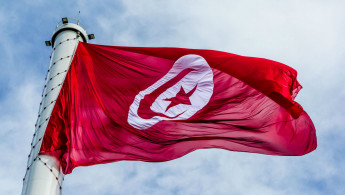Tunisians protest after man sets himself alight, mirroring death that sparked Arab Spring
Abdelwahed Hablani died on Friday after setting himself on fire in Jelma, Tunisia, in protest against poverty and poor living conditions.
2 min read
Mohammed Bouazizi's self-immolation sparked the Arab Spring [Getty]
Dozens of demonstrators blocked roads in Tunisia's south on Saturday following the death of a man who burned himself to death in protest.
Abdelwahed Hablani, 25, set himself alight and died in hospital on Friday in protest against poor living conditions and poverty, mirroring the 2010 self-immolation of Mohammed Bouazizi, whose death triggered the Arab Spring revolutions.
Police used tear gas to disperse the protesters in the southern city of Jelma after they used burning tyres to block roads, witnesses told Reuters. The demonstrations continued late into Saturday evening.
Hablani, who found ocassional work as a casual labourer, was buried on Saturday in Jelma, near Bouazizi's home city of Sidi Bouzid in Tunisia's deprived interior.
Mass protests following Bouazizi's death led to the January 2011 revolution that forced veteran leader Zine El Abidine Ben Ali, who died in exile earlier this year, out of power, and inspired revolutionary movements in Egypt, Libya, Syria and beyond.
Read more: Can Tunisia survive foreign attempts to derail its democracy?
Since Bouazizi's death, several other young Tunisian men have set themselves alight in protest against the country's continuing economic difficulties.
Tunisia held free parliamentary and presidential elections in September and October this year. Economic frustrations and the perceived failure of former governments to provide adequate public services led voters to largely eschew the major parties.
Similar concerns have motivated mass protest movements this year in Lebanon and Iraq.
Protests erupted in Iraq in early October, with the mostly young and Shia population of the capital and country's south voicing anger with endemic corruption and economic mismanagement.
The demonstrations have swollen in size, scope and fury since then, with protesters targeting symbols of Iranian influence and calling for a new government.
Iraqis have been faced by a brutal crackdown in what amounts to the country's biggest crisis since Islamic State group militants seized large swathes of the country five years ago. More than 420 people killed and 15,000 wounded so far, according to an AFP tally.
Later in October, protests against a proposed tax on WhatsApp calls in Lebanon ballooned into an unprecedented unaligned mass movement calling for an end to corruption, poor public services, financial mismanagement, sectarianism and an entrenched political elite.
Follow us on Twitter and Instagram to stay connected





 Follow the Middle East's top stories in English at The New Arab on Google News
Follow the Middle East's top stories in English at The New Arab on Google News


![22 Arab countries at COP29 have rejected the targeting of fossil fuels [Getty]](/sites/default/files/styles/image_330x185/public/2024-11/GettyImages-2184289638.jpg?h=199d8c1f&itok=ptHl5bec)